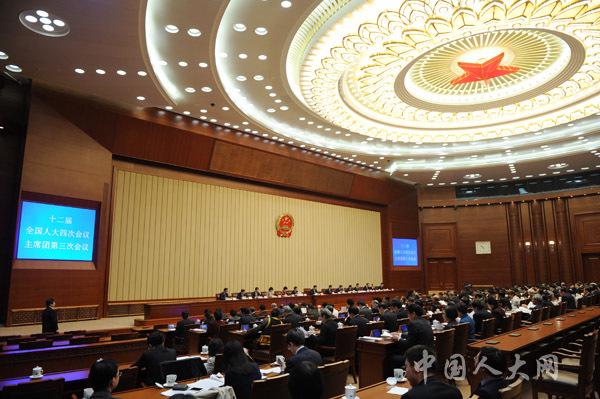On the morning of March 16, China's national lawmakers passed the third draft of the charity law with 2636 affirmative votes, 131 dissentient and 83 abstentions in the closing meeting of the fourth session of China's 12th National People's Congress.
One principle the said draft stipulates that individuals cannot directly launch fund-raising activities, with the explanation "Such fund-raising activities carried out by individuals are not transparent. There are no restrictions on how donated assets will be used, and it is hard to separate donated assets from individual assets. It is not easy to supervise. "
Individuals or organizations refuse to make the promised donation will be sued by charity organizations.
It has been 10 years since the charity law was firstly on the agenda. The first charity law will take effect from September 1, beginning the new age of ruling "charity" by law. September 5 is set as "China's Charity Day".
#China passes first charity law by 2,636 to 131 at closing meeting of #NPC session Wed. 83 abstained. pic.twitter.com/CyNNSUSRql
— People's Daily,China (@PDChina) 2016年3月16日
Below is Six Questions on China's Draft Charity Law
Chinese lawmakers started discussing the draft Charity Law on Wednesday at the annual session of the National People's Congress. The following are six core issues relating to the new law.
1. Can individuals raise money for charity?
Answer: No
Draft: Charitable fund-raising means the activities of charitable organizations to raise funds for the purpose of charity. These activities include raising money from the public and from specific units and individuals.
Interpretation:
One principle of the Charity Law is that individuals cannot directly launch fund-raising activities. Such fund-raising activities carried out by individuals are not transparent. There are no restrictions on how donated assets will be used, and it is hard to separate donated assets from individual assets. It is not easy to supervise.
by Kan Ke, deputy director of the Legislative Affairs Commission of the NPC Standing Committee
Individuals are not qualified to launch charitable fund-raising activities. Organizations must get registered at the country's civil affairs authorities to launch charitable fund-raising activities, such as China Charity Federation, Red Cross Society of China, other foundations and charitable organizations.
by Zhang Tiehan, a NPC deputy and vice president of Liaoning Charity Federation
2. Can individuals seek help from the public?
Answer: Yes
Draft: Unqualified organizations and individuals can cooperate with qualified charitable organizations and raise donations from the public through them. The donations will be supervised and managed by the qualified charitable organizations. Any organizations and individuals are prohibited from carrying out fund-raising activities to fraudulently raise money in the name of charity.
Interpretation:
The Charity Law does not prohibit individuals from seeking help from the public. If someone, or their relatives, were in trouble, they can raise some money from the public to solve the problems. The law does not ban such behaviors. Such behavior is mutual aid behavior in communities, and donors have the prospect to get help from the beneficiaries later. The behavior is not real charity, and the Law does not ban it.
by Kan Ke, deputy director of the Legislative Affairs Commission of the NPC Standing Committee
If individuals launch fund-raising activities through the Internet, not for themselves and their relatives, such behavior is illegal. When the law is enacted, even fund-raising activities launched online by social celebrities in their name are still illegal.
by Li Yinglu, an executive director of the China Philanthropy Research Institute under Beijing Normal University
3. Must donations come through charitable organizations?
Answer: It depends
Draft: Donors can give their money to charitable organizations, or give the money directly to beneficiaries.
Interpretation:
Donors can enjoy the country's preferential tax policies while donating a large amount of money to charitable organizations. If they had no need to enjoy the preferential tax policies in donating a small amount of money, they can directly give the money to beneficiaries.
by Zhang Tiehan, a NPC deputy and vice president of Liaoning Charity Federation
4. Can individuals or organizations refuse to make the donation that they promised earlier?
Answer: No
Draft: Donors, who have made public announcements through TV, radio or other media, promising to donate a certain amount of money, will be violating the donation agreement if they failed to make donations in due time. Charity organizations and the supposed donation beneficiaries can sue them, or file a petition for the court to order them to pay.
Interpretation:
Once one makes a promise of donation, he/she cannot retract it. Charity organizations are given the legal rights to sue them for the default. Companies and individuals have to be discreet in making such public promises.
by Shi Jie, CPPCC member, lawyer from Grandall Law Firm
5. Can charity organizations or donation recipients freely spend the remaining part of the money, after the initial goal was achieved?
Answer: It depends
Draft: If an agreement already exists on how to deal with the excess money, follow the agreement. If not, charitable organizations should spend the money on other similar charity projects, and publish the related information to the public.
Interpretation:
For one condition, donations for individuals, let's say donations for a patient, the rest part of the money can be used for his subsequent treatment, checkups, fitness exercises, etc. For the other conditions, if charitable organizations have the money, they should give the money to other people in need. Such cases vary, and more detailed legal provisions are needed.
by Shi Jie, CPPCC member, lawyer from Grandall Law Firm
6. Can a company get tax deductions after making donations?
Answer: Yes
Draft: Individuals and institutions who made donations are entitled to favorable tax policies, according to law.
Interpretation:
Favorable tax policies to companies doing charity are an important way to promote philanthropy. Current law prescribes detailed tax benefits for donors, charitable organizations and donation recipients.
by Kan Ke,deputy director of the Legislative Affairs Commission of the NPC Standing Committee
(Source: China Daily)









